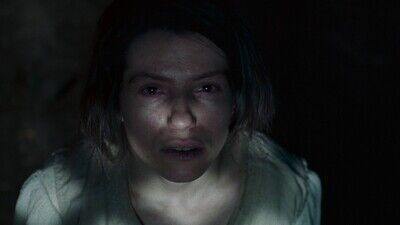Agnes starts and remains trapped by her association with the intolerant residents of an 18th-century “Upper Austria” settlement. Agnes has depression, a condition that’s tellingly stigmatized in this movie’s title. Her story is largely defined by her helplessness, not by her distinct character or even communal identity, making it increasingly difficult to care when her life inevitably becomes defined by degradation and pain.
Agnes lives in hope, somehow. She prays fervently, works industriously, and generally tries to make a happy life with Wolf (David Scheid), her insensitive husband. Wolf spends all the money he can get on a house that Agnes doesn’t love, one that’s located a little too close to his miserable but dutiful mother, Gänglin (Maria Hofstatter), who predictably does not care for Agnes. Wolf frequently talks to Gänglin rather with his wife. He’s obviously bad at sex, too, as we see in a needlessly cruel but handsomely lit bedside scene.
Agnes’s terror and uncertainty predominate this standout moment, but in a way that suggests that, on some level, she’s still processing her hopelessness. No matter how absurd or unlikely it may seem to an outside observer, there’s still a chance for Agnes to do something with the hand that life has dealt her. Then again, “The Devil’s Bath” begins with a shocking act of violence and ends with two more. You don’t need to abandon all hope to enter the movie’s painterly frame, but that sort of blind submission often seems to be the only emotional threshold to cross.
How, then, can we relate to Agnes beyond her initial curiosity and pitiful investment in a world that apparently does not care enough to notice her or her needs? We join her as she attends and devotes herself to rituals that are unyielding, at best, and threatening, at minimum. She finds no joy in work, release from her home life, or pleasure in charity. Somehow, Agnes’s most relatable and saddening release is her devotion to prayer. She often humbles herself through formal devotion and daily tasks and usually tries to become more than the sum of her needs. “Please grant me a child,” she begs aloud, right before Plaschg’s face peeks out from behind a lattice-covered window. We see the moon in the sky, and for a moment, we share her yearning.

